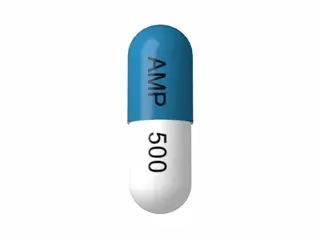| Package | Dosage | Price | Price per Dose | |
|---|---|---|---|---|
| Dosage: 250mg | ||||
| 270 pill | 250mg | NZD300.41 | NZD1.11 | |
| 180 pill | 250mg | NZD205.67 | NZD1.14 | |
| 120 pill | 250mg | NZD140.72 | NZD1.16 | |
| 90 pill | 250mg | NZD110.94 | NZD1.22 | |
| Dosage: 500mg | ||||
| 270 pill | 500mg | NZD657.68 | NZD2.44 | |
| 180 pill | 500mg | NZD449.27 | NZD2.49 | |
| 120 pill | 500mg | NZD308.53 | NZD2.57 | |
| 90 pill | 500mg | NZD251.69 | NZD2.79 | |
| 60 pill | 500mg | NZD189.44 | NZD3.14 | |
| 30 pill | 500mg | NZD110.94 | NZD3.71 | |
| 20 pill | 500mg | NZD83.88 | NZD4.20 | |
| 10 pill | 500mg | NZD43.28 | NZD4.25 | |

Acillin Description
Overview of Acillin
Acillin is an antibiotic medication that belongs to the penicillin group. It is commonly used to treat a variety of bacterial infections. The active ingredient in Acillin works by inhibiting the growth of bacteria, preventing them from multiplying and spreading within the body. This medication is often prescribed for infections of the respiratory tract, skin, urinary tract, and other bacterial conditions. It is important to follow the prescribed dosage and duration of treatment to ensure the effectiveness of the medication and reduce the risk of resistance.
Effectiveness and Benefits
Many patients report positive outcomes when using Acillin for their bacterial infections. It is known for its rapid action and effectiveness against a broad spectrum of bacteria. Users often notice symptom relief within a few days of starting treatment. The medication helps clear up infections, reduces inflammation, and alleviates discomfort. Because it targets bacteria specifically, Acillin tends to have fewer side effects compared to broader-spectrum antibiotics. It is considered a reliable option for treating common bacterial infections, especially when the causative bacteria are sensitive to penicillin antibiotics.
Possible Side Effects and Precautions
While Acillin is generally well-tolerated, some individuals may experience side effects. Mild reactions include nausea, vomiting, diarrhea, and skin rashes. Serious allergic reactions, though rare, can occur and may present as swelling, difficulty breathing, or severe skin reactions. Patients with a known penicillin allergy should avoid Acillin to prevent allergic responses. It is also essential to inform your healthcare provider if you have any kidney problems, or if you are pregnant or breastfeeding. Proper medical supervision can help mitigate risks and manage side effects effectively.
Usage Guidelines
Acillin should be taken exactly as prescribed by a healthcare professional. The medication is typically administered orally in the form of capsules or tablets. It’s advisable to take the medication with a full glass of water, preferably on an empty stomach or as directed by your doctor. Completing the full course of treatment is crucial, even if symptoms improve early on. This helps ensure all bacteria are eradicated and reduces the risk of developing antibiotic-resistant strains. If a dose is missed, it should be taken as soon as remembered, but skipping doses can compromise treatment success.
Storage and Handling
To maintain the efficacy of Acillin, it should be stored in a cool, dry place away from direct sunlight. Keep it out of reach of children to prevent accidental ingestion. Do not use the medication beyond the expiration date printed on the packaging. Proper storage ensures the medication remains effective throughout its shelf life and reduces the chance of contamination or spoilage.
See Also
